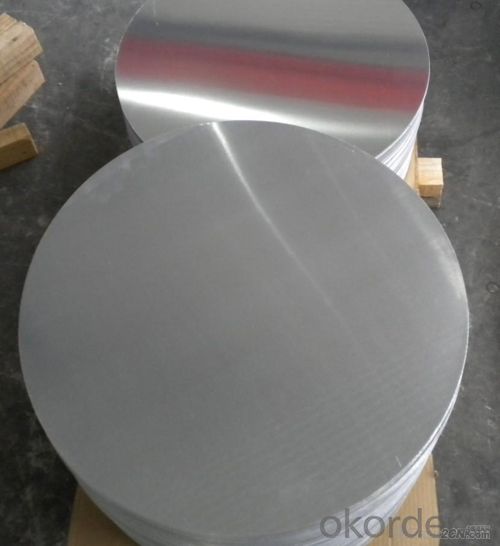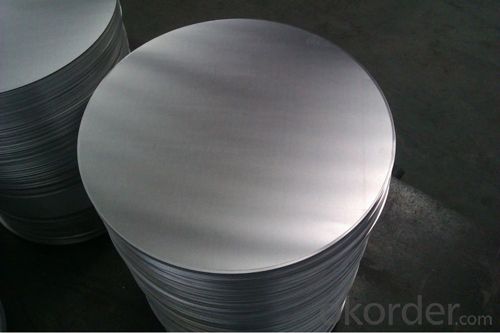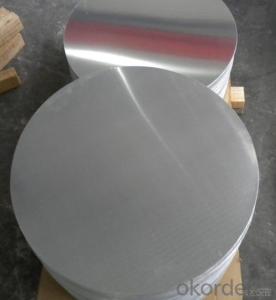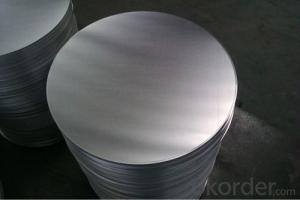Non-Stick Round aluminum Circle Disk for Utensils
- Loading Port:
- China main port
- Payment Terms:
- TT OR LC
- Min Order Qty:
- 3 m.t.
- Supply Capability:
- 10000 m.t./month
OKorder Service Pledge
OKorder Financial Service
You Might Also Like
Item specifice
1. Description of Non-Stick Round aluminum Circle Disk for Utensils
Alloy: 1050, 1070, 1100, 3003, etc
Thickness: 0.5mm~4mm
Temper: O, H14
Diagonal: 100mm - 1200mm
2. Application of Non-Stick Round aluminum Circle Disk for Utensils
Aluminium Circle is widely used for kitchen wares including fried pans, non-sticky pans, cooking pots, hard anodize cook ware, pressure cooker and house hold utensils etc.
3. Feature of Non-Stick Round aluminum Circle Disk for Utensils
Aluminium Circle has great ductility, heat conductivity, anti-corrosion and moisture resistance properties.
4. Certificate:
SGS and ROHS(if client request, paid by client), MTC(plant provided), Certificate of Origin(FORM A, FORM E, CO), Bureau Veritas and SGS (if client request, paid by client), CIQS certificate
5. Image of Non-Stick Round aluminum Circle Disk for Utensils


6. Package and shipping of Non-Stick Round aluminum Circle Disk for Utensils
eye to sky
eye to wall
with wooden pallet (wooden case also available)
7. FAQ
1) What is the delivery time?
Dpends on actual order, around 20 days
2) What is the QC system:
We have QC staff of 20 persons and advanced equipment, each production is with MTC traced from Aluminum ingot lot.
3) What market do you mainly sell to?
Australia, America, Asia, Middle East, Western Europe, Africa etc
- Q:Are aluminum coils suitable for solar reflectors?
- Indeed, solar reflectors can indeed be made using aluminum coils. Aluminum, being highly reflective and durable, is extensively employed as a material for solar reflectors. Its reflective surface effectively redirects sunlight towards the intended destination, be it a solar panel or collector. Moreover, the lightweight and malleable nature of aluminum coils make them perfect for crafting curved or angled reflector surfaces. The reflective coating on these coils is also capable of enduring harsh weather conditions, ensuring long-lasting functionality. All in all, aluminum coils are an exceptional option for solar reflectors, given their reflectivity, durability, and adaptability.
- Q:When you open an aluminum beverage can, do particles of aluminum get into the drink?
- No. Aluminum has metallic bonds, so atoms don't break off that easily.
- Q:Can aluminum coils be used in the production of architectural panels?
- Yes, aluminum coils can be used in the production of architectural panels. Aluminum is a popular material for architectural panels due to its lightweight, durability, and versatility. Aluminum coils can be easily shaped, cut, and formed into various panel designs, making them suitable for a wide range of architectural applications.
- Q:What is the role of aluminum coils in HVAC systems?
- The role of aluminum coils in HVAC systems is crucial for the efficient functioning of the system. Aluminum coils are an essential component of the air conditioning unit as they are responsible for transferring heat between the indoor and outdoor environments. When the air conditioning unit is in cooling mode, the aluminum coils act as evaporator coils. They help in absorbing heat from the indoor air, thus cooling it down. The warm air from the room passes over the cold aluminum coils, and the heat is transferred to the refrigerant flowing through the coils. This process cools the air and removes moisture, resulting in the desired cooling effect. In heating mode, the aluminum coils function as condenser coils. They receive the hot refrigerant from the compressor and transfer the heat to the surrounding air. This hot air is then distributed throughout the building, providing warmth during colder weather. Aluminum coils are preferred in HVAC systems due to their excellent heat transfer properties and resistance to corrosion. They are lightweight, durable, and have a high thermal conductivity, allowing for efficient heat exchange. Moreover, aluminum coils are more environmentally friendly compared to other materials like copper, as they are easier to recycle. Regular maintenance and cleaning of the aluminum coils are necessary to ensure optimal performance and prevent any airflow restrictions caused by dust, dirt, or debris buildup. Neglecting coil maintenance can lead to reduced cooling or heating capacity, decreased energy efficiency, and potential system breakdowns. Overall, aluminum coils play a vital role in HVAC systems by facilitating the heat transfer process, enabling efficient and effective temperature control in both cooling and heating modes, and contributing to the overall comfort and functionality of the system.
- Q:Why does the end face of aluminum coil have grease spots?
- The reason may be that the manufacturer hasn’t cleaned. Before being coated, the aluminum should be cleaned carefully. Otherwise the paint will peel off.
- Q:I have a diamond back bike with an aluminum frame. will it rust if i ride or put it in the frame? is it bad for the bike?
- Aluminum frames do NOT rust the corrode and unless you live close to the ocean you have little to worry about with the frame. it will be the other components on the bike like the wheels and spokes that may rust if the bike is left outside. If you didnt pay much for the bike then plan on some rust if you leave it out!
- Q:What are the different types of surface finishes for decorative purposes?
- There are several types of surface finishes for decorative purposes, including glossy, matte, textured, metallic, and antique finishes.
- Q:for purchasing aluminium are the grades to be mentioned
- Aluminum alloy designations are described by a 4-digit index system. The first digit indicates the alloy group according to the major alloying elements. 1XXX - 99% Al with no major alloying element. 2XXX – copper 3XXX – Manganese 4XXX – Silicon 5XXX – Magnesium and silicon 7XXX – Zinc 8XXX – other element Experimental alloy designations have an “X” prefix Aluminum temper designations (suffixes) describe heat-treatable and non heat-treatable alloys.
- Q:How much is one ton of aluminum coil?
- The price of aluminum sheet is calculated according to the price of aluminum ingot + processing fee (aluminum plate state), and the specific price is also different according to the size and size of aluminum sheet.If you have any questions, please ask. I hope to help you.
- Q:What are the different sizes available for aluminum coils?
- Aluminum coils are available in various sizes to meet the diverse needs of different industries and applications. The sizes of aluminum coils can vary depending on factors such as the intended use, manufacturing process, and customer requirements. Generally, aluminum coils are available in a range of thicknesses, typically ranging from 0.2mm to 8mm. The width of aluminum coils can vary from as narrow as a few inches to more than 60 inches. The length of aluminum coils can be customized, but standard lengths are often around 1000mm to 6000mm. The specific sizes available for aluminum coils may also depend on the manufacturing capabilities of the supplier or manufacturer. Some suppliers may offer a wide variety of sizes to cater to different customer demands, while others may have a more limited range of sizes. It is important to note that the availability of specific sizes may also be subject to minimum order quantities or lead times. Therefore, it is advisable to consult with the supplier or manufacturer to inquire about the specific sizes available and any limitations or requirements that may apply. Overall, the different sizes available for aluminum coils provide flexibility for customers to choose the most suitable dimensions for their specific applications and requirements.
1. Manufacturer Overview |
|
|---|---|
| Location | |
| Year Established | |
| Annual Output Value | |
| Main Markets | |
| Company Certifications | |
2. Manufacturer Certificates |
|
|---|---|
| a) Certification Name | |
| Range | |
| Reference | |
| Validity Period | |
3. Manufacturer Capability |
|
|---|---|
| a)Trade Capacity | |
| Nearest Port | |
| Export Percentage | |
| No.of Employees in Trade Department | |
| Language Spoken: | |
| b)Factory Information | |
| Factory Size: | |
| No. of Production Lines | |
| Contract Manufacturing | |
| Product Price Range | |
Send your message to us
Non-Stick Round aluminum Circle Disk for Utensils
- Loading Port:
- China main port
- Payment Terms:
- TT OR LC
- Min Order Qty:
- 3 m.t.
- Supply Capability:
- 10000 m.t./month
OKorder Service Pledge
OKorder Financial Service
Similar products
New products
Hot products
Hot Searches
Related keywords




























